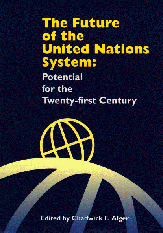 |
About the publication The future of the United Nations system: Potential for the twenty-first century |
UNITED NATIONS UNIVERSITY PUBLIC FORUM
MAINTAINING PEACE THROUGH THE UNITED NATIONS
IN THE TWENTY- FIRST CENTURY
15 June 1998
(1.00 to 2.45 p.m)
Dag Hammarskjold Library Auditorium, United Nations, New York
The United Nations University's next Public Forum will be held on Monday, 15 June 1998, from 1:00 to 2:45 p.m. at the Dag Hammarskjold Library Auditorium at United Nations Headquarters in New York.
 |
About the publication The future of the United Nations system: Potential for the twenty-first century |
The Forum's focus will be the launching of the publication on The future of the United Nations system: Potential for the twenty-first century. This volume is a project of the Research Commissions of the International Peace Research Association (IPRA) and is published by the United Nations University Press.
Dr. Chadwick F. Alger, Mershon Professor of Political Science and Public Policy Emeritus of the Ohio State University and Editor of the volume will present an overview and focus on Prevention of violence and disruptive conflict through peace keeping and peace building in the United Nations. Dr. Ho-Won Jeong, Institute for Conflict Analysis and Resolution, George Mason University will speak on The UN and global economic policies. This will be followed by a panel discussion which will include the participation of H.E Samuel R. Insanally, Ambassador Extraordinary and Plenipotentiary, Permanent Mission of the Republic of Guyana to the United Nations and former President, UN General Assembly and Mr. Alvaro de Soto, Assistant Secretary-General, Department of Political Affairs, United Nations.
Twenty-two scholars from all continents, including Elise Boulding, Hans Gunter Brauch, Bjoern Moeller, Hilkka Pietila, Mauricio Andres Ribeiro, Kumar Rupesinghe and Raimo Vayrenen, have contributed twelve chapters that encompass prevention of violence, creating economic and social structures that sustain human fulfillment, sharing and protecting the commons and peace education. The search for future potential, based on experience in these twelve "laboratories", leads to sixty-six recommendations for new instruments and programs on issues that relate to control of weapons, humanitarian intervention, collaboration between UN peacekeepers and NGOs, human rights, economic policies, advancement of women, refugees, ecological security, communications, and peace education.
The recommendations include proposals for the Bretton Woods Institutions, IAEA, ILO, ITU, the Trusteeship Council, UN Centre for Human Rights, UNCTAD, UNDP, UNEP, UNESCO, UNHCR, UNIDO, UNU, and WIPO. Suggested new instruments include a UN Institute for Mediation and Dispute Resolution, NGO Rapid Response Teams, an Early Warning Information Service, a UN Peace Education Fund, a World Court for the Environment, enhancement of UN capacity for institutional memory, and mechanics for wider participation of local governments and organizations.